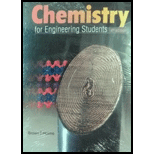
Concept explainers
(a)
Interpretation: The number of
Concept Introduction:
All radioactive decays show first order kinetics. This, half-life and decay constant are related to each other as follows:
Where,
k is the decay constant
(a)
Answer to Problem 14.102PAE
Solution:
Explanation of Solution
Calculating decay constant for
Now, calculate the number of decays per second in 1 mole of the
(b)
Interpretation: Energy released in a single
Concept Introduction:
The mass defect is calculated as the difference of masses of products and reactants. The energy released can be related to mass defect as follows:
Here,
Also, 1 amu = 931.7 MeV
(b)
Answer to Problem 14.102PAE
Solution:
Explanation of Solution
Calculate the mass defect as follows:
Mass Defect
Since, 1amu =931.7 MeV
Thus,
Thus, energy released will be
(c)
Interpretation:
The heat evolved in one minute by the decay of the 1 mol sample of 26Al from part (a) should be calculated.
Concept Introduction: In one mole of a substance there are
(c)
Answer to Problem 14.102PAE
Solution:
Explanation of Solution
Converting decay per second to decay per minute as follows:
In 1 mole there are
number of particles also the calculated energy released is equal to heat thus, heat evolved per minute per mole will be:
Want to see more full solutions like this?
Chapter 14 Solutions
Chemistry for Engineering Students
- Name the following molecules with IUpacarrow_forwardWhat is the molecular orbital for cyclopropenyl anion and is it aromatic, antiaromatic or nonaromatic?arrow_forwardUsing the chart describe the change from cystine to tyrosine and its impact on the protein. Using the chart describe the change from histidine to aspartic acid and its impact on the protein.arrow_forward
- How to get the predicted product of this reaction belowarrow_forwardPlease help me fill out the chart then using the chart describe the change from cystine to tyrosine and its impact on the protein. Then using the chart describe the change from histidine to aspartic acid.arrow_forwardWrite the Esterification reaction mechanism for acetic acid, and one propanol to make propanol ethanoate (molecule that gives peas its odor in flavor)arrow_forward
 Chemistry: Principles and ReactionsChemistryISBN:9781305079373Author:William L. Masterton, Cecile N. HurleyPublisher:Cengage Learning
Chemistry: Principles and ReactionsChemistryISBN:9781305079373Author:William L. Masterton, Cecile N. HurleyPublisher:Cengage Learning Chemistry: The Molecular ScienceChemistryISBN:9781285199047Author:John W. Moore, Conrad L. StanitskiPublisher:Cengage Learning
Chemistry: The Molecular ScienceChemistryISBN:9781285199047Author:John W. Moore, Conrad L. StanitskiPublisher:Cengage Learning Principles of Modern ChemistryChemistryISBN:9781305079113Author:David W. Oxtoby, H. Pat Gillis, Laurie J. ButlerPublisher:Cengage Learning
Principles of Modern ChemistryChemistryISBN:9781305079113Author:David W. Oxtoby, H. Pat Gillis, Laurie J. ButlerPublisher:Cengage Learning Chemistry by OpenStax (2015-05-04)ChemistryISBN:9781938168390Author:Klaus Theopold, Richard H Langley, Paul Flowers, William R. Robinson, Mark BlaserPublisher:OpenStax
Chemistry by OpenStax (2015-05-04)ChemistryISBN:9781938168390Author:Klaus Theopold, Richard H Langley, Paul Flowers, William R. Robinson, Mark BlaserPublisher:OpenStax Chemistry & Chemical ReactivityChemistryISBN:9781337399074Author:John C. Kotz, Paul M. Treichel, John Townsend, David TreichelPublisher:Cengage Learning
Chemistry & Chemical ReactivityChemistryISBN:9781337399074Author:John C. Kotz, Paul M. Treichel, John Townsend, David TreichelPublisher:Cengage Learning Chemistry for Today: General, Organic, and Bioche...ChemistryISBN:9781305960060Author:Spencer L. Seager, Michael R. Slabaugh, Maren S. HansenPublisher:Cengage Learning
Chemistry for Today: General, Organic, and Bioche...ChemistryISBN:9781305960060Author:Spencer L. Seager, Michael R. Slabaugh, Maren S. HansenPublisher:Cengage Learning





